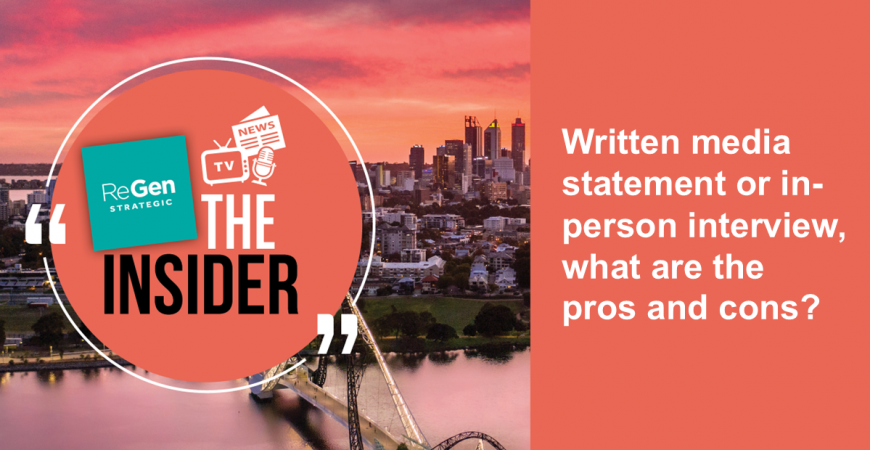As a media advisor, I am often faced with the question of whether to offer up a written statement in response to a media enquiry or set up an in-person interview. While a written statement has many benefits for the client, including providing the time to finely craft and edit key messages, enabling multiple people within the organisation to review, and decreasing the margin for error, there are also some limitations to providing a response in writing.
In a crisis, or any situation where you don’t yet have all the details, a written statement is almost always the safest choice.
But in many other situations, if your spokesperson knows the issue, has well-crafted key messages and is media trained, an interview may actually be the right choice.
And sometimes, the best option for a radio interview may even be to go into the studio rather than do the interview over the phone. This allows you to build a rapport with the interviewer, enables the interview to flow more smoothly since you can read non-verbal cues, and personalises you in the eyes of the interviewer.
But no matter what the situation, particularly when it comes to requests from broadcast media, it’s worth considering an interview over a written statement.
Here’s five reasons why:
- It shows your organisation is willing to show up and be accountable.
At best, providing a written statement can be interpreted by journalists and audiences as your company not willing to be transparent, and at worst, that your company may even have something to hide. Doing an interview demonstrates that you are willing to be accountable and answer questions and that you are confident in your company’s position.
- It demonstrates you’re taking the issue seriously.
If your CEO or a member of your executive team is willing to do an interview, it demonstrates to your stakeholders that you are taking the issue seriously enough to make the time and effort to focus on the issue and give it the attention it deserves. Providing a written statement can be interpreted as taking the easy way out.
- It personalises your organisation.
This can be particularly important in situations where your company is being criticised for something. It demonstrates your company isn’t just a nameless/faceless organisation and reminds audiences that your company is made up of real people. Particularly if your organisation has made a mistake, the reasons for this are more likely to be accepted if a real person fronts the media and explains it.
- It enables you to add context.
Even if you have been provided with a journalist’s questions and write your statement based on these, there are significant limitations in providing a written statement. Answering questions in an interview will enable you to explain situations, add details and give examples and anecdotes you wouldn’t have included in a written statement.
- It can build goodwill with media, audiences and your stakeholders.
Even if you don’t answer every question perfectly, or you don’t know the answer to everything, most journalists and audiences will appreciate the fact you were at least willing to front up and give it a go.
For information on our media relations or media training services, please contact ReGen Strategic.
 ReGen Strategic
ReGen Strategic